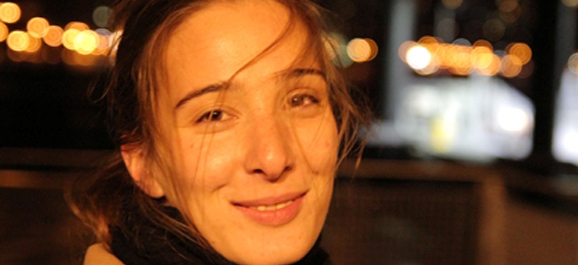IRENA ČURIK
Irena Čurik (1983., HR), spisateljica, redateljica, dramaturginja, koreografkinja i eksperimentalna kazališna autorica završila je diplomski studij dramaturgije na Akademiji dramskih umjetnosti u Zagrebu.
Od 2008. stvara nezavisne, autorske projekte u Teatru &TD u Zagrebu (‘Je n’ais plus d’idées’, ‘Disleksija’, ‘Sutra, sutra’, ‘_replacements for Years of refusal’). Bila je stipendistica ArtsLink-a za 2011. te je u sklopu programa 6 tjedana provela na umjetničkoj rezidencije na Yale – School of Drama.
Hrvatska je kazališna predstavnica u europskom projektu Apap-Performing Europe mreže Apap. Putem međunarodnog rezidencijalnog programa organizacija članica mreže ima prilike raditi u sedam europskih zemalja i stvarati vlastite produkcije.
Osim izvedbenih umjetnosti angažirana je u medijima radija, filma, literature i teorije. Razvila je eksperimentalni i originalni pristup umjetnosti.
Irena Čurik (1983, HR), writer, director, dramaturge, choreographer and experimental theater maker, holds a master degree in dramaturgy from Academy of drama arts in Zagreb.
From 2008 she makes independent, author projects in Theatre &TD in Zagreb (‘Je n’ais plus d’idées’, ‘Dyslexia’, ‘Tomorrow, tomorow’, ‘_replacements for Years of refusal’). She is an ArtsLink fellow for 2011 having her 6-weeks artist residency at Yale – School of drama.
She is Croatian theatre representative in the European project Apap-Performing Europe conceived and managed by Apapnet. Through international residential program of the network’s member organizations she has the opportunity to work in seven European countries and create her own productions. Beside performing arts she is engaged in radio, film, literature and theory mediums. She has developed experimental and original approach to arts.
INTERVJU
Ovog puta neću govoriti u svoje ime, pustit ću Rolanda Barthesa da govori za mene. Vjerujem mu. Sljedeće spekulacije preuzete su iz‘Roland Barthes by Roland Barthes’ (University of California Press, 1977.).
1. Od kud počinješ i kako?
“No nikada nisam izgledao tako” – Kako znaš? Koji je to ja kojem si sličio ili nisi? Gdje ga nađeš – kojom morfološkom ili ekspresivnom kalibracijom? Gdje je tvoje autentično tijelo? Ti si jedini koji ne može samog sebe nikada vidjeti osim kao sliku. Nikada ne vidiš svoje oči ako nisu zamućene pogledom u zrcalo ili u objektiv (Želim vidjeti svoje oči samo kada gledaju u tebe) to još više vrijedi za tijelo, osuđen si na repertoar njegovih slika.
2. Kojim putem ideš?
‘Često sam se dosađivao kao dijete. Dosada je započela veoma rano, nastavila cijeli moj život, u naletima (no sve rjeđe, zahvaljujući prijateljima i poslu) i drugima je uvijek bila primjetljiva. Panična dosada koja se osjetila na predavanjima, vijećanjima, zabavama na kojima sam bio okružen strancima, društvenim igrama, gdje god se dosada mogla jasno uočiti. Može li dosada biti vrsta histerije?
3. Kamo želiš stići?
‘ ‘Sve što se u nama dogodilo, dogodilo se jer smo mi uvijek mi, a nijednu minuti isti. (Diderot, Réfutation d’Helvetius).’
INTERVIEW
I won’t speak in my name this time; I will let Roland Barthes speak for me. I believe him.
Following speculations are taken from ‘Roland Barthes by Roland Barthes’ (University of California Press, 1977).
1.Where are you starting from and how?
‘But I never looked like that!’ – How do you know? What is the ‘you’ you might or might not look like? Where do you find it – by which morphological or expressive calibration? Where is your authentic body? You are the only one who can never see yourself except as an image; you never see your eyes unless they are dulled by the gaze they rest upon the mirror or the lens (I am interested in seeing my eyes only when they look at you): even and especially for your own body, you are condemned to the repertoire of its images.’
2. Which way are you going?
‘As a child I was often and intensely bored. This evidently began very early, it has continued my whole life, in gusts (increasingly rare, it is true, thanks to work and to friends), and it has always been noticeable to others. A panic boredom, to the point of distress: like the kind I feel in panel discussions, lectures, parties among strangers, group amusements: wherever boredom can be seen. Might boredom be my form of hysteria?’
3. Where are you going to?
‘ ‘Everything has happened in us because we are ourselves, always ourselves, and never one minute the same’ (Diderot, Réfutation d’Helvetius).’ Sve se dogodilo u nama zato što smo mi mi sami, uvijek mi sami, i nitijedne minute isti.


